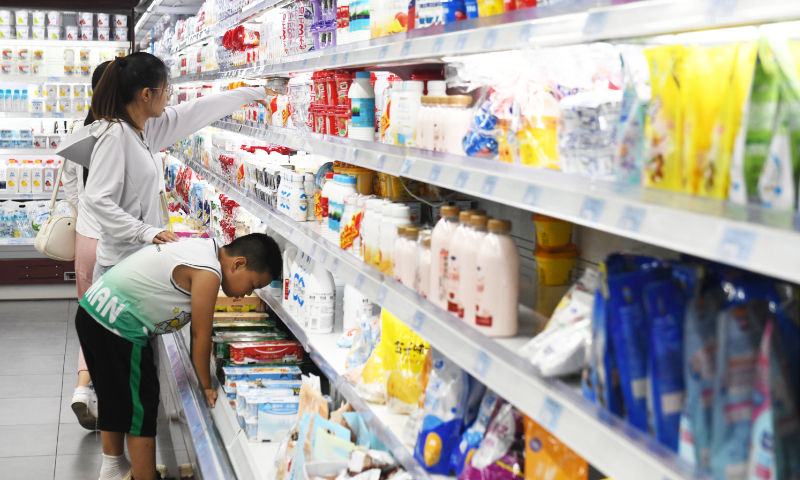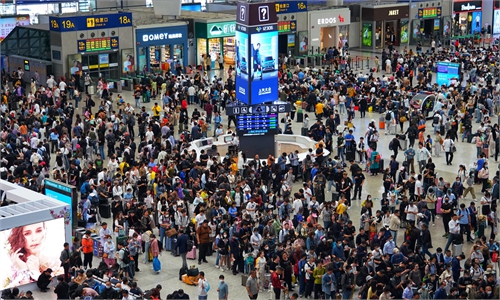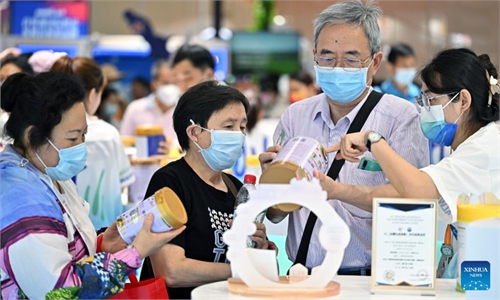China's economy maintains recovery track in July, albeit at slower pace
Economy may 'turn for better as support policies are implemented'

People shop for dairy products at a supermarket in Xinle, North China's Hebei Province, on August 15, 2023. Photo: VCG
China's retail sales in July grew by 2.5 percent year-on-year, remaining on a recovery track but at a slower pace, official data released on Tuesday showed. Although the reading was weaker than expected, the consumption sector is set to stage a further rebound in the second half as consumer confidence improves and support policies kick in, officials and experts noted.
Retail sales, a crucial economic indicator, grew by 2.5 percent year-on-year to 3.68 trillion yuan ($505.17 billion) in July, according to data released by the National Bureau of Statistics (NBS) on Tuesday. The reading was lower than 3.1 percent in June and 12.7 percent in May. In the January-July period, retail sales grew by 7.3 percent year-on-year.
Notably, the retail sales of services went up by 20.3 percent year-on-year in the first seven months.
Although July consumption was dragged down by weak big-ticket spending, the sector remained a driving force of the economy and services consumption saw an accelerated recovery, Fu Linghui, an NBS spokesperson, told a press conference on Tuesday, noting that the slowdown was mainly caused by lackluster vehicle consumption.
However, the NBS spokesperson set a positive tone for consumption growth in the coming months, citing multiple factors.
"Along with a broader economic recovery, and an improvement in jobs and incomes, the willingness to spend is set to improve," Fu said, noting that recently released policies to boost consumption will gradually take effect in the coming months.
Zhou Maohua, an economist at Everbright Bank, told the Global Times on Tuesday that July's weaker-than-expected consumption was in part due to low consumer confidence and slack consumption in housing-related sectors.
Despite the downward pressure, consumption is set to recover further as consumer confidence improves in the second half of the year, Zhou said.
"Consumer sentiment in China was still in the process of turning to optimistic from defensive, and cautious sentiment on spending on durable items persisted during the month," Zhou said.
However, consumption in tourism, catering and accommodation, and transportation maintained growth momentum, Zhou pointed out.
"Domestic consumption will continue to recover with benefits from pro-consumption stimulus, amid low inflation levels and slightly loose monetary policy, so sentiment may improve in the coming months."
In recent weeks, China has rolled out support policies to shore up the economy, with measures to bolster a wide range of sectors from property to consumption. It also rolled out specific measures to boost the private sector, a vital source of jobs, and rural areas, which are believed to have higher growth potential. A number of cities have rolled out favorable policies to shore up housing sales.
On Tuesday, the People's Bank of China (PBC), the central bank, cut its seven-day reverse repurchase rate by 10 basis points (bps) to 1.8 percent, and lowered the rate on the medium-term lending facility by 15 bps to 2.5 percent, injecting liquidity into the banking system, following rate cuts in June.
The PBC also lowered the one-month standing lending facility interest rate by 10 bps to 3.15 percent.
During a seminar on Tuesday, the Ministry of Industry and Information Technology vowed to promote and ensure the stable growth of the consumer goods industry, tapping the potential of the home furniture, plastics, paper and battery industries.
The move followed a guideline released on Monday to promote the high-quality development of rural circulation, as part of a national campaign to unleash the consumption potential of rural areas to ensure long-term stable economic growth.
It will take time for support policies to be fully implemented and show an effect, and experts called for more targeted policies to spur consumption.
Yang Delong, chief economist at Shenzhen-based First Seafront Fund Management Co, told the Global Times on Tuesday that as support policies land, the economy could be nearing a turning point from slowdown to growth, Yang said.
However, Yang said that the July consumption data showed a recovery that lacked strong momentum, and more support policies would be needed.
More targeted policies need to be rolled out for the property sector to release demand, Yang said.
Sun Chuanwang, a professor at Xiamen University, told the Global Times on Tuesday that more policy support is needed to bring down borrowing costs for spending on big-ticket items.
"July's retail growth reading will be among the low points in the year, and Chinese consumers' relatively high saving levels will offer support to the consumption recovery in the next stage," Sun said, noting that the intensity of the consumption recovery depends on whether policies can accurately ratchet up residents' confidence and create conditions for spending that caters to people's diversified needs.
Cai Fang, a member of the monetary policy committee at the PBC, urged policymakers to lean further toward boosting household consumption by putting money in residents' pockets, calling it the most urgent goal, according to an article posted late Monday on a social media account of the China Finance 40 Forum, a think tank.
Boosted by robust summer tourism, the services sector saw fast growth, especially the modern services industries, according to the NBS.
Fu noted that as a number of first- and lower-tier cities roll out policies to support home sales to meet inelastic and upgrading demand, the property sector will improve.
Consumers' demand for smart and intelligent products also grew. In the second quarter, China surpassed the US as the largest single market for iPhones in terms of shipments, data from market analysis site TechInsights showed.




